We are thrilled to roll out a project we’ve been working on the for the last year. Thanks to a grant from the Southern Extension Risk Management Education Center, I’ve worked with my colleagues in the Ag Economics Department at Texas A&M to pull together legal and economic resources related to hemp production. You can find the website here.

Photo by Michelle McAfee on Unsplash
Specifically, this project is designed as a series of short video presentations (three hours in total) to address the major issues facing Texas hemp producers. When you visit our webpage, the video library will be located on the righthand side of the screen by topic. Click on the topic of your choice, and then you will find a list of available videos to view.
We have videos addressing the following issues:
- Dr. George Knapak gives us a great overview of the basics of the hemp plant and hemp production. This is a fantastic 101-type lesson for anyone who wants to learn more about hemp production and the hemp industry.
- I then recorded numerous videos related to the key legal issues for hemp producers. We cover the USDA Final Hemp Rule, the Texas Department of Agriculture, contracting considerations for producers, and a look at additional legal issues including nuisance, trespass, and hemp for feed.
- Dr. Justin Benavidez then did a detailed walk-through of hemp budgets for various products and a price outlook and overview.
- Dr. Greg Kaase offers an explanation of the FARM Assistance program and how it can help with financial analysis and comparisons of different crops.
- Dr. Steven Klose discusses crop insurance options for hemp producers in Texas.
We are excited about this project and think it will be a great source of information for farmers considering hemp production in Texas.
Check out the various information on the website or on YouTube, and be sure to take part in the short evaluation to let us know if the information provided was helpful.
This project was made possible by funding from the Southern Extension Risk Management Education Center and the United States Department of Agriculture.














